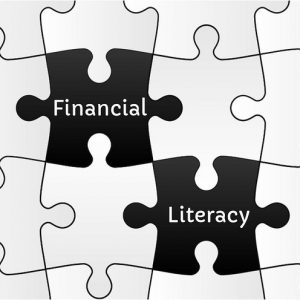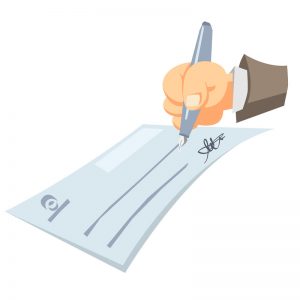Over the last decade, I really wish I had tracked how much money NLA has recovered by carefully auditing our royalty statements every accounting period. Because of some big errors found a couple of years ago, it’s probably to the tune of over $600,000 recovered at this point, and it wouldn’t surprise me if that total was actually more. Even now, nary an accounting period goes by that we don’t recover at least $500 to $3,000 owed to a client.
On rare occasions, we have even found errors in the Publisher’s favor—and yes, we do notify them to highlight the correction. Luckily, those have only amounted to several hundred dollars at any given time. And to be clear, Publishers aren’t being nefarious or deliberately cheating the author (with the exception of a few publishers, which will remain unnamed).
Most errors we catch are human errors. In other words, the Publisher’s in-house royalty management staff simply keyed incorrect information into their accounting system. Also, “accounting departments” at some mid-sized publishers and small presses are staffed by English majors. Mistakes will be made.
These mistakes need to be found and corrected and the monies paid to the author client. Here is the jaw-dropping fact: A good percentage of agents do not audit their clients’ royalty statements.
Let me repeat that. Even though authors hire literary agents to guide their careers and most importantly, manage their business publishing interests (royalties being a huge component of this), many agents do not actively audit or even read client royalty statements. This leaves authors to fend for themselves regarding reading and understanding their statements.
So for me, good literary agents audit royalty statements. When I was newer to this business, I did the time-consuming auditing and analysis myself, every accounting period, and shared my comments with my client. Every accounting period. I even hired a professional book royalty auditor to mentor and read behind me to assess my competence and capability. Then I hired and trained our amazing Contracts & Royalties Manager Angie Hodapp to handle this at NLA.
And Angie took it to a level that leaves me in awe every accounting period. I imagine our clients are often in awe as well when every six months, she sends a detailed letter with my comments as well as her analysis of the statement and what questions we had to track down and if extra monies are owed.
A lot of the larger agencies will have staff in-house to handle this (or I hope they do….I don’t actually know as I’ve not worked in a big agency), but I’m willing to guess that most of the smaller, boutique agencies don’t. This means that the author relies on his/her agent to analyze the statements.
So ask yourself. Is your agent doing this? If you don’t know, ask. It’s part of the agenting job. Recently, Angie has been giving workshops at local writing conferences to teach authors how to audit their own royalty statements. Even if your agent does this on your behalf, it’s not a bad idea to also be checking them. Human errors can happen on our end as well!
So with her permission, and worth its weight in gold, a handy list.
How to Audit Your Own Royalty Statements by Angie Hodapp
Keep an excel spreadsheet for each title, and add the following when each statement arrives:
• Track copies sold and royalty rates applied to each edition. Do the percentages match the contract?
• If you have a royalty escalator, make sure you’re watching units sold so you can see if the escalator is triggered at the right time.
• Track royalty earnings for each edition. Add them all up and subtract them from the advance. Make sure your math matches the math on the statement.
• Check for continuity from the last statement’s bottom line (ending balance) to the current statement’s starting balance.
• If the royalty is based on net receipts, then make sure the net amount received by Publisher is reported on the statement, along with number of copies sold. Do the division. How much is the publisher claiming to have received for each unit? Is it a reasonable amount based on the retail price?
• Look at the number of copies reported sold as “high discount” or “over discount” or “special sales.” Publishers love to sell most copies under these terms, which means smaller royalties for you. Make sure your contract limits the number of copies publishers can sell under these terms!
• Watch reserves. Your contract should specify how much the publisher can hold in reserves, and for how many accounting periods after initial publication. You can ask the publisher to release reserves once returns taper off. That’s more money passing through to you, or applying toward your advance.
• Watch returns. Publishers adjust reserves up and down from period to period based on actual and projected returns.
• Watch subrights licenses. Know the terms of all subrights deals, which may include audio, large print, book club (either a stock-buy or a special printing), or other special editions.
• Watch and track foreign right deals. If your publisher holds world rights and is actively selling your work into foreign territories, ask them each accounting period to give you:
—Details of any new foreign-rights deals, including: advance, royalties split, term of license, publication date or planned publication date, and reporting schedule. (Note that most, but not all, foreign publishers report annually, not bi-annually.)
—Copies of the licensing agreements. Even if they’re in languages you don’t understand, it’s within your best interests to have such things in your physical records.
—Note that foreign monies can take from a year to 18 months to pass through the publisher’s subrights department and show up on your statements.
If you want a more in-depth royalty statement auditing experience, join Angie for her upcoming Royalty Statements Auditing Workshop, scheduled for July 30, 2015. This Webinar is open to the first twenty attendees to sign up.
*********
The genesis: In January 2015, Backspace co-founder Karen Dionne and I had a conversation in which she mentioned that writers sometimes want representation so badly they are willing to sign with an average or even a below-average agent. Trust me, not all agents are equal. I replied, “Well, writers don’t know what they don’t know.”
In that moment, a lightbulb went on for both of us. Writers don’t know what a good agent does. How could you if (1) you’ve never experienced it and (2) you’ve only ever had one agent and no way to assess just how strong he or she might be at the job?
Thus, this series of articles was born.
*********
Archive:
February 2015 Newsletter – Article #1: Agent As Savvy Business Manager
March 2015 Newsletter – Article #2: Commanding Authority: An Agent’s Negotiation Edge.
April 2015 Newsletter – Article #3: Fearless Negotiation: An Agent’s Most Important Role for an Author
May 2015 Newsletter – Article #4: Negotiation Tactics of Good Agents








